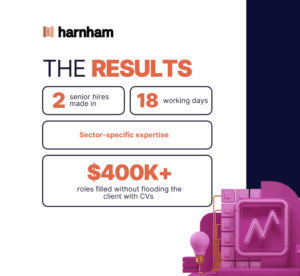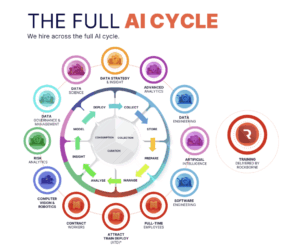 By Guillian Eller, Manager AI/ML – Harnham
By Guillian Eller, Manager AI/ML – Harnham
You’re growing fast. You needed data talent yesterday.
The reality in today’s competitive startup job search is that a highly specific role can get filled in 15 days. But without a plan for developing your specialist teams, the pattern of poor performance, constant crises, and increasing employee turnover will keep repeating itself.
If these sound familiar, you may be in need of some help with hiring for startups.
With a tight and proactive process (and the right partner), you can move from scoping to a signed offer in two weeks or less, without lowering the bar.
The Common Challenges in Fast Data Hiring
Hiring data talent feels like a race against time. You need people who can ramp up fast and make an impact, but speed brings risk.
Many founders tend to focus on growth in their new markets and products, and inadvertently overlook the critical need for strategic hiring.
Here’s what often goes wrong:
- Unclear scope: roles are defined too broadly or too late, so the search starts without alignment.
- Limited bandwidth: hiring sits alongside fundraising, client delivery, or product deadlines.
- Fierce competition: the best candidates are fielding multiple offers and vanish fast.
- Cultural mismatch: someone might be technically brilliant but struggle in a lean, fast-changing environment.
Hear from Kiran Ramasamy on the confusion around AI Hiring:
Start with Strategy: Assess Your Current Team
Before adding new hires, take stock of the team you already have.
Ask yourself:
- Which people are doing two jobs well, and which are stretched too thin?
- Who has the potential to grow into a bigger role with support?
- Where are the gaps that will widen as the business scales?
Understanding where they can evolve, and where you’ll need new capability, is the first step in building a scalable data function.
After all, not every skills gap requires an external hire. Sometimes, the faster route is to upskill or reskill the team you already have. Data professionals today are investing heavily in learning and supporting that growth internally can be a powerful retention and performance strategy.
Once you’ve identified which skills can be developed internally, you can focus your hiring on the gaps that truly need external expertise — often saving time, cost, and onboarding friction.
We explored this in our recent article: Reskilling and Upskilling: What US Data Professionals Are Doing
Best Practices for Fast, High-Quality Hiring
Here’s what we’ve seen consistently drive results for scaling data teams:
- Define the problem the role will solve. Clarity at the start shortens every step after it.
- Keep assessments practical. Use short, business-relevant exercises that test how a candidate thinks and delivers value.
- Compress interviews. Batch interviews within 48–72 hours to keep momentum high and decision-making sharp.
- Use a clear scorecard tied to business outcomes. It reduces bias and keeps discussions objective.
- Move with intent. Give feedback within 24 hours and communicate clearly throughout.

Source: Case Study on Building AI Leadership from the Ground Up
The Harnham Difference
At Harnham, we’ve refined our approach through years of helping start-ups and scale-ups grow their data capability at pace.
Thorough vetting. Every candidate is assessed not just for technical ability but for adaptability and stage fit.
Specialist expertise. Our deep industry knowledge enables us to understand your unique requirements and provide candidates who can deliver immediate value.
Long-term focus. We match candidates to trajectory, ensuring each hire grows with the business.
Tailored delivery. Whether you need a single strategic hire or a full data function, we adapt to structure, timelines, and goals.

Hiring to Scale? Let’s Make it Simple.
If you need fast, high-quality data talent or want to learn more about our rapid-hire process, connect with Guillian Eller on LinkedIn.

























